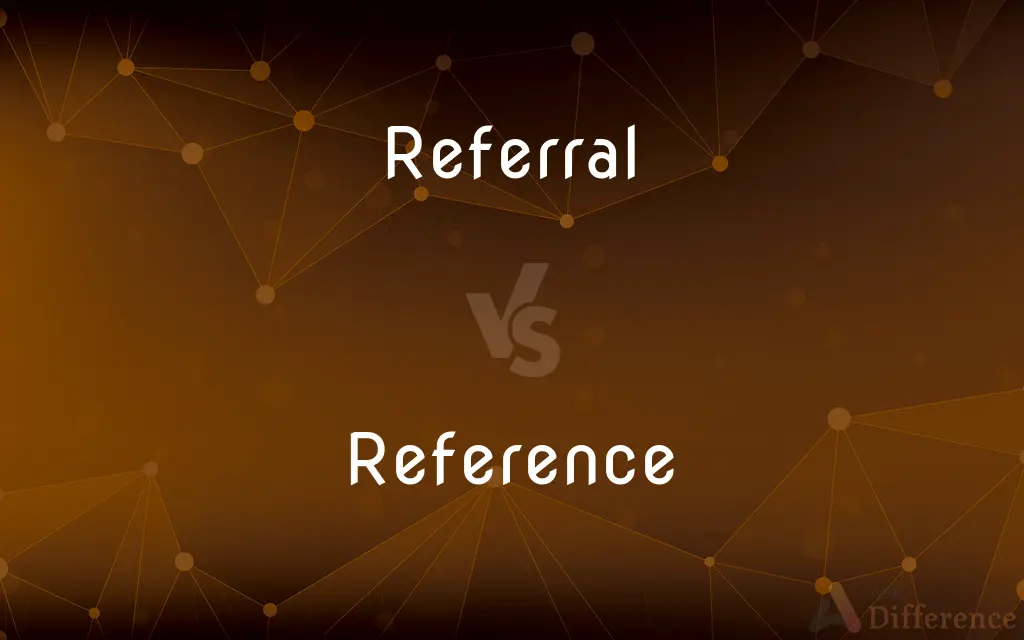Referral vs. Reference — What's the Difference?
By Tayyaba Rehman — Updated on September 26, 2023
"Referral" means recommending someone for a service or job, while "Reference" is a mention or citation of a source or person for additional information.

Difference Between Referral and Reference
Table of Contents
ADVERTISEMENT
Key Differences
"Referral" and "Reference" represent distinct concepts within professional and informational contexts. A referral typically implies the act of recommending someone for a specific service, job, or purpose. It often involves a transfer of trust, where one individual or entity relies on another’s judgment, suggesting a person or service deemed reliable or beneficial. Referrals are critical in various fields such as medicine, where a primary care doctor might refer a patient to a specialist, and in business, where satisfied customers might refer new clients to a service or product.
On the other hand, a reference is more about providing information or substantiation. It usually denotes a citation of a source or person to corroborate facts or details. In academic writing, references cite sources used to substantiate claims or provide additional information. When applying for a job, a reference is typically a person who can attest to one's qualifications, character, and experiences, providing assurance to potential employers.
Referrals serve as a conduit to connect individuals to services or opportunities, often based on trust and perceived competence. They play a vital role in professional networks and service industries, facilitating access to opportunities and specialized services. References, conversely, act as supports or proofs, whether for claims made in scholarly writing or for an individual’s competencies and character in a professional setting.
The utility of referrals primarily lies in connecting individuals to needed services, jobs, or opportunities, leveraging existing relationships and reputations. References, in contrast, operate as a means to validate, substantiate, and provide additional information or assurance, be it in academia or the job market. While referrals are active conduits, references function more as passive substantiations, each serving unique roles in their respective domains.
Comparison Chart
Definition
The act of recommending someone for a service or job.
A mention or citation of a source or person.
ADVERTISEMENT
Purpose
To connect individuals to services or opportunities
To substantiate or provide additional information
Context
Professional networks, service industries
Academic writing, job applications
Action
Active, involves recommending and connecting
Passive, involves citing or mentioning
Role
Conduit
Support or Proof
Compare with Definitions
Referral
Recommending someone for a service or job.
The doctor gave a referral to a renowned specialist.
Reference
Mentioning or citing a source or person for additional information.
The author included several references to support his argument.
Referral
An act of directing someone to a different place or person for information, help, or action, typically relating to employment or medical needs.
The agency gained several new clients through referrals.
Reference
An individual who can attest to one’s qualifications, character, and experiences.
Please provide three references when you submit your application.
Referral
The process of directing or redirecting (as a medical case or a patient) to an appropriate specialist or agency for definitive treatment.
The patient was given a referral to a cardiologist.
Reference
A book or passage mentioned as illustrative or corroborative.
The book has a detailed list of references at the end.
Referral
An individual’s name given as a reference.
His referral spoke highly of his professional demeanor.
Reference
Reference is a relationship between objects in which one object designates, or acts as a means by which to connect to or link to, another object. The first object in this relation is said to refer to the second object.
Referral
An act of handing over (a legal case or solicited client) from one lawyer to another for a fee.
The lawyer received several cases as referrals from colleagues.
Reference
The act of referring to something
Filed away the article for future reference.
Referral
To direct to a source for help or information
Referred her to a heart specialist.
Referred me to his last employer for a recommendation.
Reference
Significance for a specified matter; relation or relationship
Her speeches have special reference to environmental policy.
Referral
To submit (a matter in dispute) to an authority for arbitration, decision, or examination.
Reference
Meaning or denotation
The reference of the word “lion” is to a kind of wild cat.
Referral
To direct the attention of
I refer you to the training manual.
Reference
A mention of an occurrence or situation
Made frequent references to her promotion.
Referral
To assign or attribute to; regard as originated by.
Reference
A note in a publication referring the reader to another passage or source.
Referral
To assign to or regard as belonging within a particular kind or class
Referred the newly discovered partita to the 1600s.
Reference
The passage or source so referred to.
Referral
To relate or pertain; concern
Questions referring to yesterday's lecture.
Reference
A work frequently used as a source.
Referral
To serve as a descriptor or have as a denotation
The word chair refers to a piece of furniture.
Reference
A mark or footnote used to direct a reader elsewhere for additional information.
Referral
To speak or write about something briefly or incidentally; make reference
Referred during our conversation to several books he was reading.
Reference
Submission of a case to a referee.
Referral
To turn one's attention, as in seeking information
Refer to a dictionary.
Reference
Legal proceedings conducted before or by a referee.
Referral
The act or process of transferring someone or something to another, of sending by reference, or referring.
The insurance company insists I get a referral from my regular doctor. I can't just go to the specialist; a GP has got to refer me.
Reference
A person who recommends another or who can vouch for another's fitness or qualifications, as for a job.
Referral
(slang) A document used by schools detailing some form of a student's misbehavior and listing the actions taken before and after the student's receipt of the referral.
After misbehaving in class, George was given a referral for disrupting class and sent to the office.
Reference
A statement about a person's qualifications, character, and dependability.
Referral
A recommendation to consult the (professional) person referred to;
This patient is a referral from Dr. Bones
Reference
To supply (a text) with references
The author hadn't adequately referenced the third chapter, so the copyeditor suggested adding more citations. This article is thoroughly referenced with up-to-date sources.
Referral
The act of referring (as forwarding an applicant for employment or referring a matter to an appropriate agency)
Reference
To cite as a reference
The monograph doesn't reference any peer-reviewed articles.
Reference
Usage Problem To mention or allude to
The comedian's monologue referenced many Hollywood stars.
Reference
A relationship or relation (to something).
Reference
A measurement one can compare (some other measurement) to.
Reference
Information about a person, provided by someone (a referee) with whom they are well acquainted.
Reference
A person who provides this information; onlyn in UK English: a referee.
Reference
A reference work.
Reference
(attributive) That which serves as a reference work.
Reference Dictionary of Linguistics
Reference
The act of referring: a submitting for information or decision.
Reference
(semantics) A relation between objects in which one object designates, or acts as a means by which to connect to or link to, another object.
Reference
(academic writing) A short written identification of a previously published work which is used as a source for a text.
Reference
(academic writing) A previously published written work thus indicated; a source.
Reference
(computing) An object containing information which refers to data stored elsewhere, as opposed to containing the data itself.
Reference
A special sequence used to represent complex characters in markup languages, such as
™ for the ™ symbol.Reference
(obsolete) Appeal.
Reference
To provide a list of references for (a text).
You must thoroughly reference your paper before submitting it.
Reference
To refer to, to use as a reference.
Reference the dictionary for word meanings.
Reference
To mention, to cite.
In his speech, the candidate obliquely referenced the past failures of his opponent.
Reference
(programming) To contain the value that is a memory address of some value stored in memory.
The given pointer will reference the actual generated data.
Reference
The act of referring, or the state of being referred; as, reference to a chart for guidance.
Reference
That which refers to something; a specific direction of the attention; as, a reference in a text-book.
Reference
Relation; regard; respect.
Something that hath a reference to my state.
Reference
One who, or that which, is referred to.
Reference
The act of submitting a matter in dispute to the judgment of one or more persons for decision.
Reference
Appeal.
Reference
A remark that calls attention to something or someone;
She made frequent mention of her promotion
There was no mention of it
The speaker made several references to his wife
Reference
A short note recognizing a source of information or of a quoted passage;
The student's essay failed to list several important citations
The acknowledgments are usually printed at the front of a book
The article includes mention of similar clinical cases
Reference
An indicator that orients you generally;
It is used as a reference for comparing the heating and the electrical energy involved
Reference
A book to which you can refer for authoritative facts;
He contributed articles to the basic reference work on that topic
Reference
A formal recommendation by a former employer to a potential future employer describing the person's qualifications and dependability;
Requests for character references are all to often answered evasively
Reference
The most direct or specific meaning of a word or expression; the class of objects that an expression refers to;
The extension of `satellite of Mars' is the set containing only Demos and Phobos
Reference
The act of referring or consulting;
Reference to an encyclopedia produced the answer
Reference
A publication (or a passage from a publication) that is referred to;
He carried an armful of references back to his desk
He spent hours looking for the source of that quotation
Reference
The relation between a word or phrase and the object or idea it refers to;
He argued that reference is a consequence of conditioned reflexes
Reference
Refer to;
He referenced his colleagues' work
Reference
A point or set of points in relation to which position or movement is determined.
The architect used a historical building as a reference.
Reference
The use of a source of information in order to ascertain something.
The scientist made a reference to previous studies in his research.
Common Curiosities
Does a referral play a crucial role in professional networks and service industries?
Absolutely, referrals are essential in professional networks and service industries, connecting individuals to opportunities and services.
Is a referral the act of recommending someone for a service or job?
Yes, a referral typically involves recommending someone for a specific service, job, or purpose.
Can a reference be a person who can attest to one’s qualifications and character?
Yes, a reference can be a person who vouches for one’s qualifications, character, and experiences.
Is a reference used to substantiate claims in academic writing?
Yes, references are used in academic writing to substantiate claims and provide additional information.
Can referrals be based on trust and perceived competence?
Yes, referrals often involve a transfer of trust, relying on another’s judgment of a person or service’s reliability or competence.
Share Your Discovery

Previous Comparison
Hypothesis vs. Hypotheses
Next Comparison
Done vs. FinishedAuthor Spotlight
Written by
Tayyaba RehmanTayyaba Rehman is a distinguished writer, currently serving as a primary contributor to askdifference.com. As a researcher in semantics and etymology, Tayyaba's passion for the complexity of languages and their distinctions has found a perfect home on the platform. Tayyaba delves into the intricacies of language, distinguishing between commonly confused words and phrases, thereby providing clarity for readers worldwide.















































